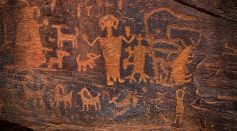Tags: Indigenous people
Yanomami Crisis in Brazil Sparked Outrage; Indigenous People Killed by Disease, Mining

Ancient DNA from Uruguay Gives a Glimpse of South America's 'Lost' Indigenous People

Indigenous Peoples Defend the Peruvian Amazon With Modern Technology
Maori, Possibly the First Humans to Travel to Antarctica 1,000 Years Before Russian Expedition

Climate Change May Have Caused Major Population Collapse of Amazon Indigenous People 400 Years Before European Arrival

Newly-Found Connection Between Culture and Biodiversity Could Help Wildlife, Indigenous Populations Survive

Mankind Has Sustainably Shaped Earth for at Least 12,000 Years

13th Century People Make Blankets From Turkey Feathers

8-Mile Long Rock Painting From the Ice Age, Discovered
Importance of Rights-Based Conservation in Attaining Global Biodiversity

Indigenous People Are Teaching Researchers About the Environment
UN to Lend a Helping Hand to Indigenous Peoples Worldwide
Mental Health Discussions Opens To Aboriginal Communities
Most Popular

Can Plastic Ever Be Fully Recycled? New Research Breakthroughs in Plastic Recycling

Is Reality a Simulation? What Physics Says About the Simulation Theory and Reality Physics

Why Hasn't Science Solved the Consciousness Mystery Yet—and What's Holding Brain Research Back

12 Fascinating Facts About the Human Brain Scientists Have Discovered Through Neuroscience





